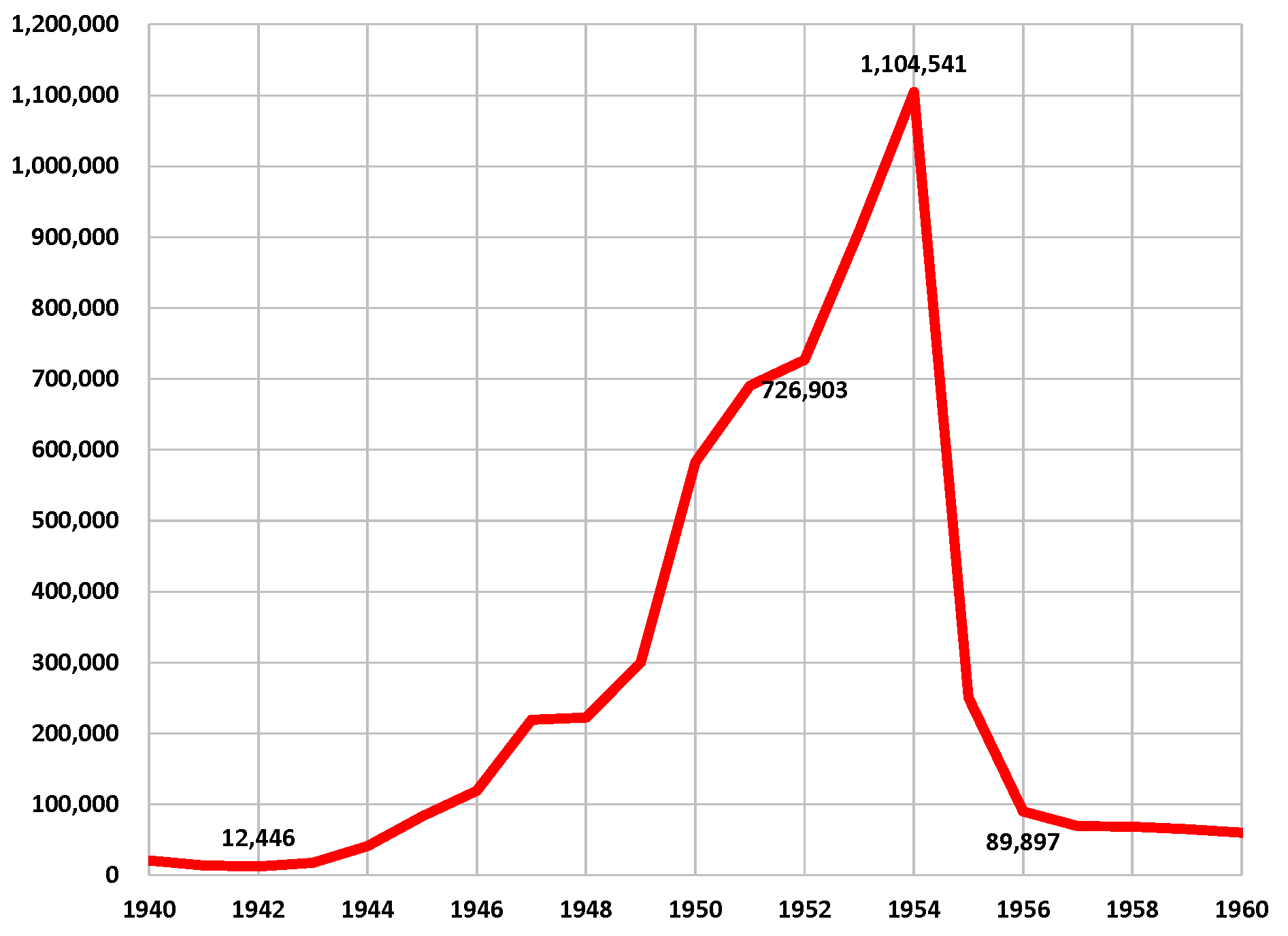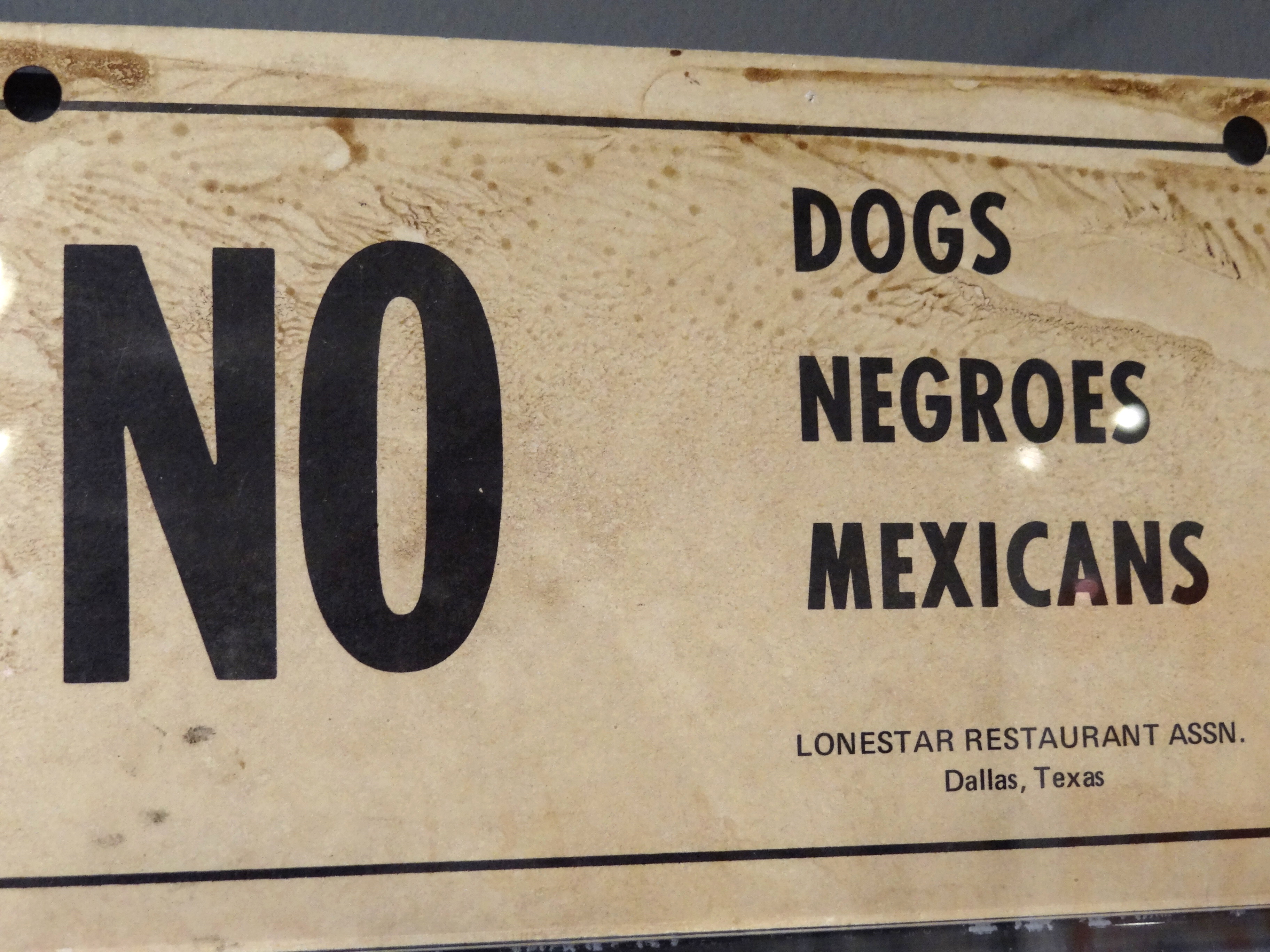|
Wetback (slur)
Wetback is a derogatory term used in the United States to refer to foreign nationals residing in the U.S., most commonly Mexicans. The word mostly targets Illegal immigration to the United States, illegal immigrants in the United States. Generally used as an ethnic slur, the term was originally coined and applied only to Mexicans who entered the U.S. state of Texas from Mexico by crossing the Rio Grande, which is the Mexico-United States border, U.S. border, presumably by swimming or wading across the river and getting wet, i.e. getting their back wet, in the process. Usage The first use of the term ''wetback'' in ''The New York Times'' is dated June 20, 1920. It was used officially by the Federal government of the United States, US government, including Dwight D. Eisenhower in 1954, with "Operation Wetback", a project that involved the mass deportation of illegal Mexican immigrants. Usage of the term appeared in mainstream media outlets until the 1960s. The term can be used a ... [...More Info...] [...Related Items...] OR: [Wikipedia] [Google] [Baidu] |
Operation Wetback
Operation Wetback was an immigration law enforcement initiative created by Joseph May Swing, Joseph Swing, a retired United States Army lieutenant general (United States), lieutenant general and head of the United States Immigration and Naturalization Service (INS). The program was implemented in June 1954 by U.S. Attorney General Herbert Brownell Jr., Herbert Brownell. The short-lived operation used military-style tactics to remove Mexican immigrants—some of them American citizens—from the United States. Though millions of Mexicans had legally entered the country through joint immigration programs in the first half of the 20th century, with some being naturalized citizens and some once native, Operation Wetback was designed to send them to Mexico. The program became a contentious issue in Mexico–United States relations, even though it originated from a request by the Mexican government to stop the illegal entry of Mexican laborers into the United States. Legal entry of Mexic ... [...More Info...] [...Related Items...] OR: [Wikipedia] [Google] [Baidu] |
Thomas Sanchez (writer)
Thomas Brown Sanchez (born 1943) is an American novelist. Life Thomas Brown Sanchez is an American writer descendant of Spanish immigrant gamblers and Portuguese cattlemen dating back five generations to the Californias Gold Rush. He was born at the Oakland Naval Hospital in Oakland, California three months after his father was killed in the South Pacific Battle of Tawara during World War II. Early years He spent his early childhood at his Portuguese grandmother’s boarding house ín a small town on the shore of San Francisco Bay. After his mother remarried, he lived on a rural farm in the foothills of Los Gatos. When his mother became ill he was sent away to a boarding school/orphanage located in a former prison near Monterey. Throughout the 1960s he participated in many of the eras major social and political events, including anti-Vietnam War protests. Education Sanchez received a Master’s Degree in Creative writing from San Francisco State University in 1967. He went on t ... [...More Info...] [...Related Items...] OR: [Wikipedia] [Google] [Baidu] |
Anti-Hispanic And Latino Sentiment In The United States
Anti-Spanish sentiment is the fear, distrust, hatred of, aversion to, or discrimination against Spanish people, culture, or nationhood. Instances of anti-Spanish prejudice, often embedded within anti-Catholic prejudice and propaganda, were stoked in Europe in the early modern period, pursuant to the Spanish Crown's status as a power siding with the Counter-Reformation. The Spanish colonization of the Americas was also singled out as uniquely barbarous by some commentators. 20th-century Spanish historiography shaped the construct of " Black Legend" to denote such manifestations of prejudice, generally overplaying their reach and pervasiveness. The justification of the civil wars from which new republics emerged independent from Spanish rule in the Americas also partially relied on a hispanophobic discourse. Within Spain, elements of stateless nationalist movements (such as Catalan, Basque, and Galician) competing with Spanish nationalism embrace anti-Spanish views and discours ... [...More Info...] [...Related Items...] OR: [Wikipedia] [Google] [Baidu] |
Goobacks
"Goobacks" is the seventh episode of the eighth season of the animated television series ''South Park'', and the 118th overall episode of the series. In production order it is the season's sixth episode. It originally aired on Comedy Central in the United States on April 28, 2004. In the episode, people from a poverty-stricken future year of 3045 travel back in time to find work, via a recently discovered time portal. When the boys try to earn some extra money, the time-traveling immigrants are willing to do the same work for next to nothing, causing the boys to lose their jobs. This affects the town's economy and the employment of the original occupants. "Goobacks" serves as a satire of illegal immigration, and mocks both sides of the debate concerning it. The episode is widely-remembered as the origin of the catchphrase "''They took our jobs!''". Plot Early in the morning, a mysterious man appears in South Park, entering from some kind of portal. Unfamiliar with his surroun ... [...More Info...] [...Related Items...] OR: [Wikipedia] [Google] [Baidu] |
Mexico–United States Border
The international border separating Mexico and the United States extends from the Pacific Ocean in the west to the Gulf of Mexico in the east. The border traverses a variety of terrains, ranging from urban areas to deserts. It is the List of Mexico–United States border crossings, most frequently crossed border in the world with approximately 350 million documented crossings annually. Illegal immigration to the United States, Illegal crossing of the border to enter the United States has caused the Mexico–United States border crisis. It is one of two international borders that the United States has, the other being the northern Canada–United States border; Mexico has two other borders: Belize-Mexico border, with Belize and Guatemala-Mexico border, with Guatemala. Four American Sun Belt states border Mexico: California, Arizona, New Mexico and Texas. One definition of Northern Mexico includes only the six Mexican states that border the U.S.: Baja California, Chihuahua (sta ... [...More Info...] [...Related Items...] OR: [Wikipedia] [Google] [Baidu] |
Xenophobia
Xenophobia (from (), 'strange, foreign, or alien', and (), 'fear') is the fear or dislike of anything that is perceived as being foreign or strange. It is an expression that is based on the perception that a conflict exists between an in-group and out-group, in-group and an out-group and it may manifest itself in suspicion of one group's activities by members of the other group, a desire to eliminate the presence of the group that is the target of suspicion, and fear of losing a national, ethnic, or racial identity.Guido Bolaffi. ''Dictionary of race, ethnicity and culture''. SAGE Publications Ltd., 2003. Pp. 332. Alternative definitions A 1997 review article on xenophobia holds that it is "an element of a political struggle about who has the right to be cared for by the state and society: a fight for the collective good of the modern state." According to Italian sociologist Guido Bolaffi, xenophobia can also be exhibited as an "uncritical exaltation of another culture" ... [...More Info...] [...Related Items...] OR: [Wikipedia] [Google] [Baidu] |
Hispanophobia
{{Short pages monitor ... [...More Info...] [...Related Items...] OR: [Wikipedia] [Google] [Baidu] |
Anti-Mexican Sentiment
Anti-Mexican sentiment is prejudice, fear, discrimination, xenophobia, racism, or hatred towards Mexico, its people, and their culture. It is most commonly seen in the United States. Its origins in the United States date back to the Mexican and American Wars of Independence and the struggle over the disputed Southwestern territories. That struggle would eventually lead to the Mexican–American War in which the defeat of Mexico caused a great loss of territory. In the 20th century, anti-Mexican sentiment continued to grow after the Zimmermann Telegram, an incident between the Mexican government and the German Empire during World War I. Throughout US history, negative stereotypes have circulated regarding Mexicans and often reflected in film and other media. 1840s–1890s Due to the result of the Texas Revolution (1835-1836) and Texas Annexation (1845), the U.S. inherited the Republic of Texas's border disputes with Mexico, which led to the eruption of the Mexican–A ... [...More Info...] [...Related Items...] OR: [Wikipedia] [Google] [Baidu] |
Reclaiming
In linguistics, reappropriation, reclamation, or resignification is the cultural process by which a group reclaims words or artifacts that were previously used in a way disparaging of that group. It is a specific form of a semantic change (i.e., change in a word's meaning). Linguistic reclamation can have wider implications in the fields of discourse and has been described in terms of personal or sociopolitical empowerment. Characteristics A ''reclaimed'' or ''reappropriated'' word is a word that was at one time pejorative but has been brought back into acceptable usage, usually starting within its original target, i.e. the communities that were pejoratively described by that word, and later spreading to the general populace as well. Some of the terms being reclaimed have originated as non-pejorative terms that over time became pejorative. Reclaiming them can be seen as restoring their original intent. This, however, does not apply to all such words as some were used in ... [...More Info...] [...Related Items...] OR: [Wikipedia] [Google] [Baidu] |
Mojado (song)
"Mojado" is a latin pop song a written by Guatemalan singer-songwriter Ricardo Arjona for his tenth Studio album, '' Adentro'' (2005). It was released in 2006 as the lead single from the album in Mexico, but the third single from the album overall. Composition "Mojado" has norteño and tejano music Tejano music (), also known as Tex-Mex music, is a popular music style fusing Mexican influences. Its evolution began in northern Mexico (a variation of regional Mexican music known as ). It reached a larger audience in the late 20th century ... influences, mainly driven by the presence of Mexican band Intocable as featured artists on the song. Lyrically, the song revolves around immigration, El Universal (Mexico). Retrieved 23 March 2012. telling the story of ... [...More Info...] [...Related Items...] OR: [Wikipedia] [Google] [Baidu] |
Ricardo Arjona
Edgar Ricardo Arjona Morales (born 19 January 1964), known as Ricardo Arjona (), is a Guatemalan singer and songwriter. He is one of the most successful and best-selling Latin American artists of all time, with more than 20 million records sold. His music ranges from ballads to Latin pop, rock, pop rock, Cuban music, and more recently A capella, a cappella performances and a mixture of Tejano music and Norteño (music), Norteño music, and Latin music (genre), Latin sounds. Arjona is noted for his lyrical style, and often addresses topics such as love, sexuality, violence, racism and immigration. As of 2016, Arjona had released sixteen studio albums, one live album, nine compilation albums and forty-three singles. Four Arjona albums reached number one on the Billboard Top Latin Albums, ''Billboard'' Top Latin Albums, and ten reached number one in Argentina. Four albums had charted on the Billboard 200, ''Billboard'' 200. Four singles had reached number one on the Billboard Lati ... [...More Info...] [...Related Items...] OR: [Wikipedia] [Google] [Baidu] |





